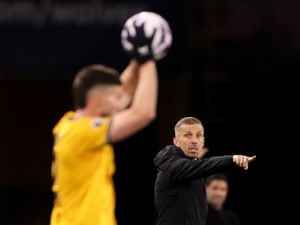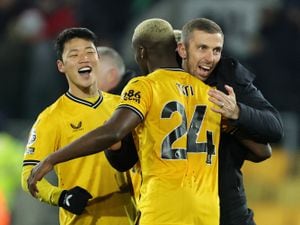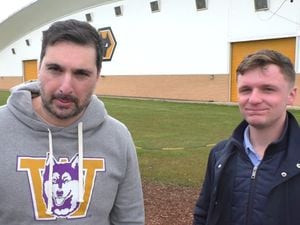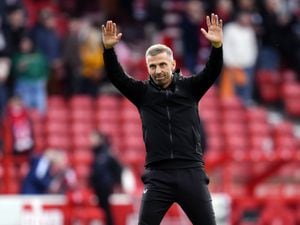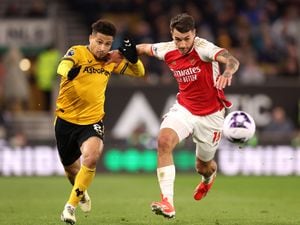Johnny Phillips: Nuno era moves into third cycle at Wolves
Life is governed by cycles; day to night, summer to autumn, child to adult.
A natural cycle in football is harder to define but managers who stay long enough at a club build more than one team. The success of their ability to regenerate or evolve is what gives them longevity.
Nuno Espirito Santo is embarking on his third cycle in just three years.
The first incarnation was a team carved out over two painstaking summer months of 2017.
The seismic shift to three at the back required immense discipline and commitment. The Championship title was vindication of the work put in, as unlikely heroes emerged in the form of Conor Coady and Matt Doherty.
The following season, Wolves recruited emphatically with the arrivals of Joao Moutinho, Raul Jimenez and Rui Patricio. As Barry Douglas, Benik Afobe and John Ruddy were cast aside, the brutal reality set in: This was a club that could no longer stand still.
The contrast to the club’s previous Premier League promotion could not have been starker.
Former manager Mick McCarthy arguably only ever had one team. His talented promotion winners of 2008/09 were not significantly augmented or developed. They never quite discovered that new identity which was going to take them forward at the next level. The 4-4-2 Championship title winners regressed into 4-5-1 Premier League strugglers.
It is unusual for a manager to be on a third cycle so quickly. Posing this question to the current longest-serving Premier League boss last week, Burnley’s Sean Dyche, it was clear in his response that his own team had not regenerated as quickly during five uninterrupted years in the Premier League.
“I don’t think the squad has changed much over that time because of the nature of the way we work,” he said. “It’s a club that’s never going to put in huge amounts of money and buy in players, we’re going to have to develop the talent. It’s a constant process of creeping up and creeping up, adding and adding. We’ll continue to do that by working to improve the players by any margins we can.”
Fosun’s Wolves operate in a different sphere when it comes to the turnover of staff.
This busy transfer window was dominated with the acquisition of full-backs – Nelson Semedo, Ki-Jana Hoever, Rayan Ait-Nouri and Fernando Marcal, who is also at home in a central defensive role. These wide areas of the pitch have been an obsession for the coaching staff. Nuno can sometimes appear frustrated when asked about formations. He prefers to talk about shape. Without getting into the realm of semantics, his logic is that players can change positions within an overall shape and team identity.
Any successful shape involves creating the right overloads at key moments in a game. With Jonny and Matt Doherty, Wolves were able to do that regularly during their first two Premier League seasons, but when their midfield supply chains were cramped and over-run, as happened at home to Watford and Huddersfield during the 2018/19 season, Wolves looked vulnerable. It led to a tweak of the formation within the shape. Leander Dendoncker added an extra man in the middle and Wolves found success with two up front. The following season brought more options in attack with Adama Traore and, latterly, Pedro Neto becoming more prominent.
This season will develop differently as Nuno looks for something the shape of the first two Premier League seasons did not deliver. As we pause for an international break, it would be unwise to read anything too meaningful into the opening chapter of this season. The four performances have been very different, often lacking in cohesion.
That is to be expected. The biggest problem with this third cycle is the preparation. When Nuno took charge in June 2017 he had that whole pre-season to work.
The following summer was much the same at Compton, with a pre-season tour to Switzerland upgrading on the more austere facilities in Austria the previous year. Matters became more frantic last season with a marketing tour to China and the Europa League qualifiers impinging on Nuno’s time, but the squad coped with the challenges and produced their best season to date.
The summer of 2020 has been another matter altogether, with the longest season in history not concluding until August 11, just a month before this campaign began. Nuno and his coaching staff have lost the control over preparation that has been key to their success.
Sometimes to move forward there has to be a significant step back. After finishing European number one golfer in 1983, Nick Faldo approached coach David Leadbetter because he believed he would not win major championships with his old swing. It was a brutal four-year process of work, but in 1987 he won the first of his six majors.
The great Australian fast bowler Dennis Lillee fractured his lower vertebrae in three places during a tour to West Indies in 1973. Dr Frank Pyke, his childhood PE teacher, oversaw his rehabilitation and helped remodel an action that developed into the most potent in world cricket.
Wolves do not need to make such drastic existential change, but if this became a season of transition and experimentation would that necessarily be a bad thing?
The absence of European football is a blessing.
There are exciting new talents in the ranks, but do not expect anything like the finished article that came with arrivals such as Patricio, Moutinho and Jimenez two years ago. The third cycle of Nuno’s era will be a work in progress for some time yet.

